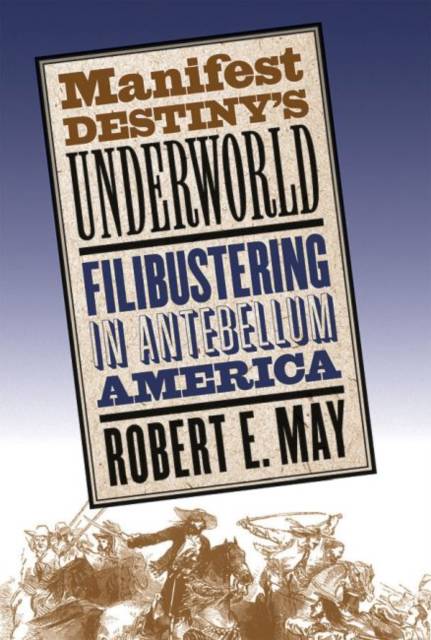
- Retrait gratuit dans votre magasin Club
- 7.000.000 titres dans notre catalogue
- Payer en toute sécurité
- Toujours un magasin près de chez vous
- Retrait gratuit dans votre magasin Club
- 7.000.000 titres dans notre catalogue
- Payer en toute sécurité
- Toujours un magasin près de chez vous
Manifest Destiny's Underworld
Filibustering in Antebellum America
Robert E May
Livre broché | Anglais
57,95 €
+ 115 points
Description
This fascinating study sheds new light on antebellum America's notorious "filibusters--the freebooters and adventurers who organized or participated in armed invasions of nations with whom the United States was formally at peace. Offering the first full-scale analysis of the filibustering movement, Robert May relates the often-tragic stories of illegal expeditions into Cuba, Mexico, Ecuador, Nicaragua, and other Latin American countries and details surprising numbers of aborted plots, as well.
May investigates why thousands of men joined filibustering expeditions, how they were financed, and why the U.S. government had little success in curtailing them. Surveying antebellum popular media, he shows how the filibustering phenomenon infiltrated the American psyche in newspapers, theater, music, advertising, and literature. Condemned abroad as pirates, frequently in language strikingly similar to modern American denunciations of foreign terrorists, the filibusters were often celebrated at home as heroes who epitomized the spirit of Manifest Destiny.
May concludes by exploring the national consequences of filibustering, arguing that the practice inflicted lasting damage on U.S. relations with foreign countries and contributed to the North-South division over slavery that culminated in the Civil War.
Robert May offers an imaginative new approach to antebellum America's notorious "filibusters--the adventurers who organized or participated in private military attacks on nations with which the United States was formally at peace. Condemned abroad as pirates, the filibusters were often celebrated at home as heroes who epitomized the spirit of Manifest Destiny. May explains the romantic, mercenary, ideological, and psychological desires that drove thousands of men to join filibustering expeditions; how they were financed; and why the U.S. government had little success in curtailing them. He also reveals the legacy of anti-Americanism that filibustering generated in Latin America, where people regarded the attackers much the way we look upon international terrorists today.
May investigates why thousands of men joined filibustering expeditions, how they were financed, and why the U.S. government had little success in curtailing them. Surveying antebellum popular media, he shows how the filibustering phenomenon infiltrated the American psyche in newspapers, theater, music, advertising, and literature. Condemned abroad as pirates, frequently in language strikingly similar to modern American denunciations of foreign terrorists, the filibusters were often celebrated at home as heroes who epitomized the spirit of Manifest Destiny.
May concludes by exploring the national consequences of filibustering, arguing that the practice inflicted lasting damage on U.S. relations with foreign countries and contributed to the North-South division over slavery that culminated in the Civil War.
Robert May offers an imaginative new approach to antebellum America's notorious "filibusters--the adventurers who organized or participated in private military attacks on nations with which the United States was formally at peace. Condemned abroad as pirates, the filibusters were often celebrated at home as heroes who epitomized the spirit of Manifest Destiny. May explains the romantic, mercenary, ideological, and psychological desires that drove thousands of men to join filibustering expeditions; how they were financed; and why the U.S. government had little success in curtailing them. He also reveals the legacy of anti-Americanism that filibustering generated in Latin America, where people regarded the attackers much the way we look upon international terrorists today.
Spécifications
Parties prenantes
- Auteur(s) :
- Editeur:
Contenu
- Nombre de pages :
- 440
- Langue:
- Anglais
Caractéristiques
- EAN:
- 9780807855812
- Date de parution :
- 30-08-04
- Format:
- Livre broché
- Format numérique:
- Trade paperback (VS)
- Dimensions :
- 140 mm x 226 mm
- Poids :
- 557 g







